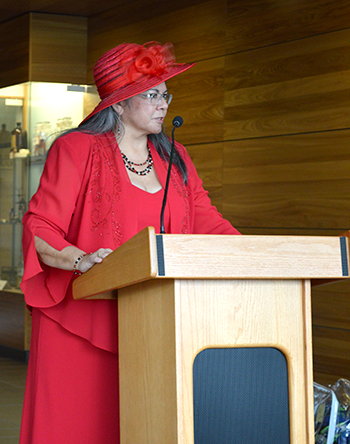by Faith Price
Dr. Robbie Paul (Nez Perce) retired on October 1, 2016 after 21 years of service to WSU. Paul was the director of WSU’s Native American Health Sciences program in Spokane.

Paul began at WSU in 1995 as the Native American Coordinator for Recruitment and Retention for the College of Nursing. Her job evolved over the years when WSU established the Native American Health Sciences office and Paul was named the director.
Having a Native American Health Sciences office is important for WSU, said Paul, for a couple of reasons. The State of Washington has one of the largest Native American populations of any state, and Native Americans face some of the greatest health disparities of any group in our nation.
“Preparing Native American health care providers is one way to help address these disparities,” said Paul. “Research has shown that having a health care provider that looks and understands their culture is very important in developing trust between a Native patient and Native provider.”
One way that Paul set about tackling this issue was by exposing Native American youth to the possibilities of a career in health. She started the Na-ha-shnee Native American Health Institute, a summer camp for Native high school students her first year at WSU. Na-ha-shnee just celebrated it’s 21st year of bringing Native students to campus.
“The camp includes hands on learning experience for the youth in nursing, medicine, physical therapy, speech and hearing, and pharmacy. I also tried to have as many as possible Native health care providers to come and present to the students, so they could learn from these Native health care providers, and see that they too can become a Native health care provider,” said Paul.
Over the years, Paul has helped guide many Native American students to careers in nursing, medicine, pharmacy, physical therapy, and other health fields.
“Robbie helped me get into the nursing program,” said Leslie Randall. Randall is from the Nez Perce tribe and is working on her doctorate in nursing. “She advocated for me during the application process. She recommended me for the Johnson and Johnson scholarship.”
Paul humbly noted that the students also inspired her.
“The students impacted me by their determination to succeed at all costs to them,” she said.
Paul was raised on the Nez Perce reservation in Craigmont, Idaho. Her own educational journey included several institutions, and multiple degrees in diverse fields. She received her bachelor’s in Clothing, Textiles and Design from the University of Idaho, a master’s in Psychology from Eastern Washington University, and a doctorate in Leadership Studies from Gonzaga University.
Her doctoral dissertation examined the impact of historical trauma on Native Americans.
“It is a five generation story of my Ni-Mii-Puu (Nez Perce) family, identifying the historical trauma in each generation,” said Paul. “Results revealed that healing could occur by placing historical pain within the context of bearing witness, affirming identity, empowerment through the memory of survival, and affirming the family world view that we are living and being Ni-Mii-Puu. Our story is no longer silenced, but has been made public and acknowledged, enabling reconciliation, forgiveness, and healing.”

In her retirement, she hopes to turn her dissertation into a book. She also has plans for two more books related to her grandparents’ experiences at Indian boarding schools. Her grandfather was sent to the Carlisle Indian Boarding School in Pennsylvania, and her grandmother attended Chemawa Indian Boarding School in Salem, OR. Their collected mementos from that time have given Paul a lot of material.
“Every student who attended received a trunk,” said Paul of her grandfather’s experience at Carlisle. “We still have this trunk, and soon after his wife died he gathered up several items that belonged to his wife, along with photo albums, baskets, beaded bags, and many other items and sent them to my father Titus Paul. It is because of these items in this trunk that I was able to find a lot of our story.”
Thus far, Paul has found plenty to keep her busy in her retirement.
“I don’t think I will be bored anytime soon with books to write, projects to finish, and finding my craft room and finding my office,” laughed Paul.